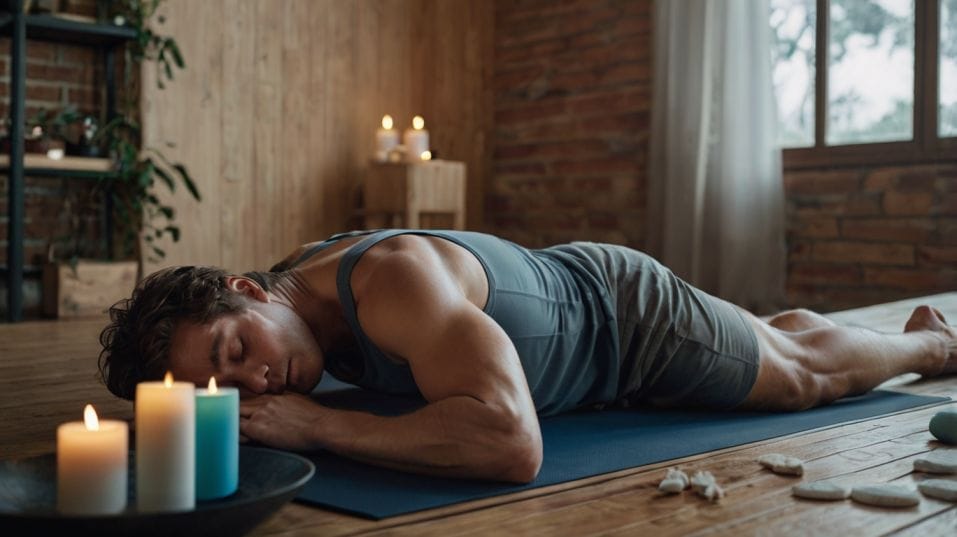Can Sleep Help You Bounce Back from Overtraining?
Struggling with progress despite training hard? Discover how better sleep can supercharge your recovery, strength, and results—starting tonight.

Are you training harder but feeling weaker? It’s not your grind—it’s your recovery. If you’re dragging through workouts, constantly sore, or stuck in a plateau, the issue likely isn’t your programming. It’s your sleep.
This overlooked powerhouse doesn’t just help you rest—it drives repair, growth, and performance. Master it, and everything else gets easier. Let’s break down why better sleep is the recovery tool you’re missing—and how to start using it tonight.
Overtraining Isn’t the Problem—Under-Recovery Is
Let’s be clear: overtraining isn’t just about training too much. It’s about not giving your body the time or conditions it needs to repair.
You don’t build muscle in the gym—you build it in recovery. Sleep is where your body does the bulk of that repair work.
When you’re asleep, especially in deep non-REM stages, your pituitary gland releases growth hormone.
That’s the stuff that drives protein synthesis, repairs tissues, and restores energy systems. Miss deep sleep, and your body falls behind on all of it.
If you’re stuck in a cycle of poor performance and constant fatigue, you’re not broken—you’re under-recovered. And odds are, your sleep is the missing link.

What Actually Happens to Your Body When You Sleep
You might think sleep is passive. It’s not. It’s one of the most biologically active phases of your day.
During sleep, your body shifts from “fight or flight” to “rest and rebuild.” Heart rate slows. Breathing deepens. Blood flow to muscles increases.
That’s when cells repair themselves, damaged tissues regenerate, and the immune system does its clean-up work.
REM sleep—usually in the second half of the night—isn’t just for dreams. It boosts brain function, sharpens motor memory, and enhances coordination.
If you’re learning new lifts, refining technique, or simply trying to stay mentally dialed in, REM sleep is non-negotiable.
Meanwhile, poor sleep messes with cortisol, insulin, and testosterone—all major players in muscle recovery, fat storage, and energy regulation. Even one bad night can disrupt these for days.
Why You Can’t Out-Train Bad Sleep
Let’s say you hit your macros, foam roll religiously, and crush every programmed set. Without solid sleep, none of it sticks.
Recovery isn't just about muscle repair—it’s about nervous system balance. Your sympathetic nervous system (that “on” switch) needs a break.
Sleep helps activate the parasympathetic system, which allows your body to relax, repair, and grow stronger.
Sleep deprivation slows reaction time, lowers pain tolerance, and increases perceived effort.
Translation: the same lift feels harder, and you’re more likely to get injured. So even if you’re showing up, your output—and your progress—is compromised.
Think of it this way: skipping sleep is like trying to lift with a half-charged barbell. You’re putting in the same effort but getting half the results.
How to Use Sleep as a Legit Recovery Strategy
Sleep hygiene isn’t a gimmick. It’s your foundation. And it doesn’t have to be complicated. You’re just giving your body the right conditions to do what it’s already built to do—heal.
Set a consistent sleep schedule
Your body runs on circadian rhythms—internal clocks that crave consistency. Go to bed and wake up at the same time every day.
Yes, even on weekends. That rhythm is what helps trigger melatonin production and keep hormone cycles steady.
Dim the lights and wind down early
Bright light—especially blue light from screens—tells your brain it’s still daytime. That delays melatonin and messes with sleep depth.
An hour before bed, cut screens or use blue-light filters. Even better? Shift into a wind-down mode with low lights, calm music, or a quick mobility session.
Cool your room
Your core body temp needs to drop for you to fall into deep sleep. The ideal room temp is around 60–67°F (15–19°C). Cracking a window, ditching heavy blankets, or using a fan can help.
Skip late caffeine
Caffeine can hang out in your system for 6–10 hours. Even if you fall asleep, it can fragment your deep sleep stages. Cut off coffee and pre-workouts by mid-afternoon if you want real recovery.
Protect your sleep like your training plan
You wouldn’t skip leg day. Don’t skip your sleep window. Treat it like a block on your calendar. Because it is part of your training.
Real-Life Gains: What You’ll Notice When You Start Sleeping Smarter
The change is quick. When you start prioritizing sleep, here’s what kicks in:
- More energy during workouts. You’ll push harder without burning out mid-session.
- Faster muscle recovery. Soreness fades faster, and you feel fresh sooner.
- Sharper mental focus. No more zoning out between sets or forgetting your rep count.
- Improved mood and drive. You’ll stop dreading workouts and start looking forward to them again.
- Visible progress. When your body isn’t stuck in survival mode, it actually grows.
None of that takes a supplement. Just quality sleep, on repeat.
Final Thoughts
Sleep isn’t the cherry on top of your recovery—it’s the base layer. It’s where strength, stamina, and progress are forged.
If you’ve been stuck in a cycle of grinding harder with fewer results, sleep is your way out. So don’t just rest. Recover.
Start tonight: Set your bedtime, cut the late-night scrolling, and commit to showing up for sleep like you do for every lift, run, or ride. Because real gains don’t start in the gym—they start the second your eyes close.




